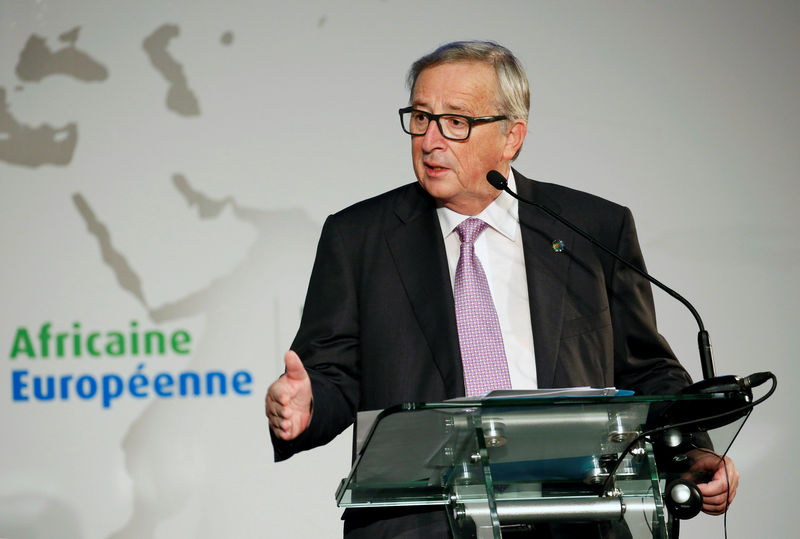 © Reuters. EU Commission President Juncker speaks during a news conference at the closing session of the 5th African Union – European Union summit in Abidjan
© Reuters. EU Commission President Juncker speaks during a news conference at the closing session of the 5th African Union – European Union summit in AbidjanBy Jan Strupczewski
BRUSSELS (Reuters) – European Union leaders will focus on trying to complete a banking union and expanding the job of the euro zone bailout fund when they discuss priorities for euro zone integration on Friday, putting off contentious issues such as a budget for the currency area.
Leaders of the 27 countries that will remain in the EU after Britain leaves in 2019 are discussing ways to deepen euro zone integration, to give direction to six months of more detailed work by finance ministers.
The aim is to better protect the 19 countries using the euro from financial crises and help rally the EU around it.
But the main players in the debate — French President Emmanuel Macron, German Chancellor Angela Merkel and European Commission President Jean-Claude Juncker — have widely differing views on what form greater integration should take.
One of the reform ideas that appears to have the broadest support is further strengthening the euro zone’s banking sector by gradually introducing a pan-European scheme to protect bank deposits across borders.
“A big part of what we’re going to discuss today is the whole idea of a banking union and guaranteeing people’s savings and deposits across the European Union,” Irish Prime Minister Leo Varadkar told reporters on entering the talks.
“If a bank runs into trouble or a bank collapses in one European country, we’ll all stand together to protect the savings of the people who put their money into it.”
NOT ALL EQUAL
But Germany and the Netherlands insist that the deposit guarantees can only become reality when risks in the banking sector are substantially reduced.
This should be done through cutting the number of bad loans banks have and adjusting the risk weighting on government bonds to better reflect the likelihood of sovereign default.
“It’s a fact that not all government bonds are created equal. The associated risk needs to be reflected on balance sheets,” Dutch Prime Minister Mark Rutte said.
The chairman of EU leaders, Donald Tusk, has said there is “broad convergence” on the idea of transforming the euro zone bailout fund, the ESM, into a European Monetary Fund and making it an emergency backstop for the euro zone’s bank resolution fund — an idea that has been on the cards since 2013.
The new fund, whose final name has yet to be decided, would handle all future bailouts, cutting out the International Monetary Fund, which has clashed with euro zone governments over debt relief for Greece in connection with its latest bailout.
But at the heart of the debate are more contentious issues, such as creating a post of finance minister and a budget for the euro zone and simplifying EU budget rules.
Paris wants a euro zone budget of several hundred billion euros, while Berlin wants no budget at all. The Commission is proposing a euro zone line in the existing EU budget.
Officials also talk of a “rainy day fund”, an unemployment insurance scheme and a fund to support investment in crisis.
EURO ZONE FINANCE MINISTER?
Rutte said healthy national finances were the best protection against external economic shocks and that there was no need for a special euro zone budget.
“I am not in favor of one big European shock absorption fund, but 19 smaller ones. These being the countries themselves and their ability to deal with crises individually,” Rutte said.
Macron would also like to see a euro zone finance minister in charge of the euro budget and the bailout fund. Germany is skeptical, unsure what powers such a position would carry.
The Commission is proposing a third option – a European Minister of Economy and Finance who would be a senior Commission official in charge of all EU money, bailout fund included, and accountable to the European Parliament.
This is anathema to euro zone governments, which see it as a power grab by EU institutions. Euro zone ministers say the 500 billion euro lending capacity of the bailout fund is ultimately backed by their national budgets, so it cannot be EU money.
Rutte on Friday backed expanding the responsibilities of the bailout fund, but said it must remain government-controlled, and that strengthening the banking sector was a more pressing need than any new additions to the euro zone set-up.
Rutte, like Germany and Slovakia, is pushing to introduce a sovereign insolvency mechanism, which would put market pressure on governments to conduct prudent fiscal policy. Countries with huge public debts, like Italy, are against.
Source: Investing.com




























